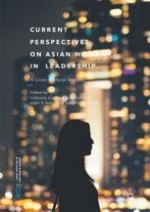2017 | OriginalPaper | Chapter
6. Korean Women in Leadership: Challenges and Opportunities
Authors : Yonjoo Cho, Hyounju Kang, Jiwon Park
Published in: Current Perspectives on Asian Women in Leadership
Publisher: Springer International Publishing
Activate our intelligent search to find suitable subject content or patents.
Select sections of text to find matching patents with Artificial Intelligence. powered by
Select sections of text to find additional relevant content using AI-assisted search. powered by
